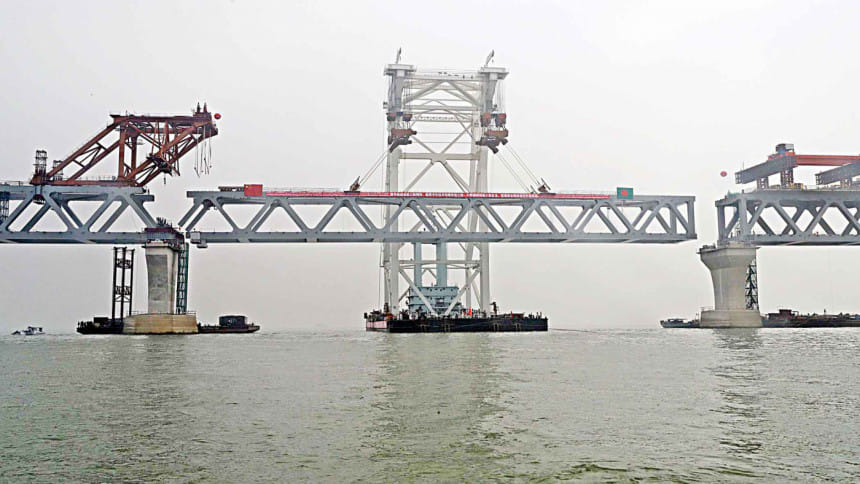Padma Bridge: Bangladesh tells a story

Historian Yuval Noah Harari, of bestsellers "Sapiens" (2011) and "Homo Deus" (2016) fame, talks about the importance of stories in human history which have the power, he says, to transform the fortune of peoples -- turning groups to tribes, to communities, to nations and, to civilizations and make them achieve wonders.
Bangladesh is such a story that has made its people achieve wonders. To that extraordinary story a new and inspiring chapter has been added titled "Padma Bridge", whose unquestioned author is Prime Minister Sheikh Hasina. It was Bangabandhu's "political will" that contributed so much to Bangladesh's birth.
Similarly, it is Sheikh Hasina's political will that lies at the core of the Padma Bridge becoming a reality. It was her single-minded determination to build it and the courage to overcome many of the vicissitudes that befell it on its way that were the key to the nation witnessing what it did yesterday -- the completion of physical structure of the bridge.

There must, of course, have been plans, counter plans, surveys, studies, detailed maps, meticulous drawings, countless reviews and endless calculations but behind it all lay the iron will of the prime minister to complete the bridge regardless of the cost.
The bridge had been transformed into a national challenge when World Bank, ADB, JICA and IDB injudiciously and without much self-examination refused to extend fund due to "corruption intention" charges that later proved unfounded. It was definitely the highhandedness and arrogance of the donors that moved them into such one-sided action. But it did tremendous damage to our image and reinforced the stereotype of a corruption ridden Third World country, the forever "basket case".
It was that "arrogance" and "highhandedness" and damage to our prestige that Sheikh Hasina decided to challenge. The disappointment of not having the bridge must have been tremendous but it was the deep wound to our self-respect that drove Sheikh Hasina to withdraw our loan application in 2013 and declare "We will have to shrug off our begging mentality", following on her earlier decision to build the bridge with our own resources.

Many thought her decision was reckless and feared diversion of our scarce resources from more urgent sectors. But Sheikh Hasina held firm. Whether the bridge that cost Tk 30,193 crore, originally estimated to cost Tk 10,161 crore, is fully justified is a question to be determined by auditors. For the PM it was the national prestige that held supreme and nothing else mattered.
One of the things that I admire most about her is her constant urging that we hold our heads high, that we prove to the world that our abilities are no less than that of others, that we never lose the confidence that we can survive and face challenges howsoever formidable. This is a very important message particularly for a country that many thought was not viable, that we would drown under our own weight of deficiencies. For a people known more for their external dependencies than for their internal capabilities the Padma Bridge stands today as a symbol of proving all the above to be fundamentally wrong.
Some may say why is building a bridge such a big deal? Pay the price and the competent companies will build it for you. Such critics miss the point that technical projects sometimes acquire larger than life symbolic values -- values of self-respect, of national self-belief, of how we want to be seen or treated by others and whether we can become dependable partners in global affairs. By building it we have truly held our heads high.
Our high growth, our living up to the MDG and then SDG goals, our graduation from the category of least developed country and, according to IMF, our growth in 2020 being the highest in Asia at 3.8 percent in spite of Covid-19, together tells a story of a steady, competent and confident Bangladesh that many developing countries can look up to and the rest of the world can work with as a well performing partner.
Let the Bangladesh story energise us and the world bestow confidence on us.

 For all latest news, follow The Daily Star's Google News channel.
For all latest news, follow The Daily Star's Google News channel. 



Comments